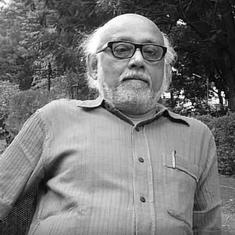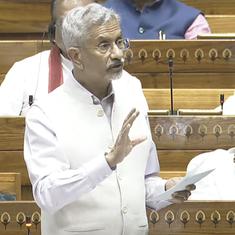In his last years, Albert Einstein was fond of saying that he went to his office on the Princeton University campus only for the privilege of walking home with Kurt Gödel. Among the foremost mathematical logicians in history, Gödel is famed for his Incompleteness Theorems. One explanation of these formulations given to laypeople like myself is that they prove no system can be both complete and consistent, where completeness means all statements in the system can be proved true or false, and consistency means no statement can be both true and false.
In April 1948, Einstein accompanied Gödel to the hearing that would confirm him as an American citizen. Although the proceeding was a formality, Gödel made a detailed study of documents related to citizenship. When the presiding officer stated that, unlike Nazi Germany (and the annexed Austria), from which Einstein and Gödel had fled, the United States would never be a dictatorship because of the rights enshrined in its constitution, Gödel replied that he had found an inconsistency in the text that would permit a dictatorship to emerge.
The citizenship process was hastily completed before Gödel defined the incompleteness of American constitutional freedoms, and we can only speculate which fatal inconsistency he had found. Most historians believe it involves Article V of the American Constitution, which deals with how the document can be amended.
The procedure laid down is notoriously difficult, with any amendment needing to be proposed by a two-thirds majority in each of the two houses of Congress and then ratified by legislatures of three-fourths of states. However, should Article V itself be successfully amended, it could in theory permit a cascade of other changes, potentially threatening civil liberties.
The Indian Constitution, unlike that of the United States, is relatively easy to amend. One Article within it, however, has seemed impervious to any meddling, and that is Article 370. It was negotiated with the erstwhile king of Jammu & Kashmir as part of the merger of that state with India, and was like a lock with two keys: it could be changed or nullified only if both India’s Parliament and Kashmir’s Constituent Assembly approved.
Separate constitution
The Constituent Assembly drew up a separate constitution for the state, which was adopted in 1956 and has applied all these years along with a separate penal code. Clause 147 of the Jammu and Kashmir Constitution states, “… No Bill or amendment seeking to make any change in (a) this section; or… (c) the provisions of the Constitution of India as applicable, in relation to the State, shall be introduced or moved in either House of the Legislature.”
Framing this clause was the equivalent of locking the room and breaking the second key. Once the constitution was approved, Jammu and Kashmir’s Constituent Assembly was dissolved, which meant the broken pieces of the key were chucked into the Dal Lake.

How, then, did Amit Shah abrogate the un-repealable Article 370 on Monday, August 5, 2019? What incompleteness did India’s Law Ministry find in its formulation? Instead of going at Article 370 directly, the Presidential order amended Article 367, which defines how constitutional provisions are to be interpreted. Newly inserted text redefined the terms “Government of Jammu & Kashmir”, “Sadar-i-Risayat (elected head of State)“ and “Constituent Assembly of Jammu & Kashmir”. The first two were now to be read as “Governor of J&K” and the third taken to mean “Legislative Assembly of Jammu & Kashmir”.
Since the Legislative Assembly of Jammu & Kashmir was dissolved by the Central government months ago, the governor currently stands in for it. In effect, every state-wide elected body in Jammu & Kashmir, past and present, is now to be interpreted to mean “governor of J&K”, who is, of course, a puppet of the Central government. Any change that could previously only be made with the consent of those bodies can now be achieved by the Centre through its man in Srinagar.
The assault on democracy
For years, India’s establishment has countered the idea of Kashmir’s right to self-determination by highlighting the democratic process in the state. The argument is disingenuous, since nobody views elections held in India under British rule as having undermined India’s quest for complete independence. Nevertheless, internal democracy was the strongest argument against Kashmiri self-determination, especially given Pakistan’s relative failure in that respect.
With a stroke of a pen, Narendra Modi and Amit Shah have destroyed that argument. By taking a series of deeply consequential decisions without a process of consultation or a vote by elected state representatives, knowing those decisions would be deeply unpopular even among Kashmiri political parties committed to the Indian republic, India’s rulers have shrugged off the cloak of democracy to reveal the naked power behind India’s control of Kashmir.
The move is motivated by the belief that people in one nation ought to have one law. It’s a compelling idea, no doubt, but needs to be balanced by the equally powerful sense that particular histories must be give their due if perfect equality is not to become a form of injustice. That is why we have quotas and reservations for women and for historically disadvantaged communities, which attempt to redress entrenched inequities even as they cut against the ideal of pure parity.
Jammu & Kashmir was not the only state to be assigned a special form of autonomy in India’s Constitution for historical reasons. At the very least, Kashmiris, on being told that as Indian citizens they should follow Indian laws, can retort that they were never asked whether they wanted to be Indian citizens in the first place. It was the whim of a king that settled their fate, and India’s latest move reneges on promises made to that king. The only factor in the country’s favour now is sheer might, military and economic.
The China Syndrome
All nations value territorial unity and integrity but perhaps none has privileged it for as long a period as China. Where India’s self-definition takes the form of the oxymoron Unity in Diversity, China believes in Unity in Unity. Its integrationist philosophy was last demonstrated through the internment of hundreds of thousands of Uighurs in Xinjiang for “re-education”.

In a recent column about Kashmir, I wrote that the Modi government’s “favoured solution is obviously a demographic makeover of the kind China has conducted in Tibet, but there are high constitutional obstacles to that ambition”. I thought those hurdles would prove a sufficient deterrent, but obviously no policy is too outlandish for the people who brought us demonetisation.
The attempt to abrogate Article 370 is likely to meet its end in the Supreme Court, but signals how close we are to slipping into authoritarian rule. If a government can produce re-interpretations of the Constitution that state that “cat” now means “dog”, and pack the Supreme Court with enough compliant judges, there is no telling where it will lead us, without even the need to declare an Emergency.
On the ground, the government has set in motion its Tibet plan, in which Hindus from the mainland eventually overwhelm Muslim Kashmiris with their wealth, buying up all the land and settling in large numbers. The reaction is bound to be immediate and intense. There will be blood, and it has probably begun flowing already. The administration knows it, which is why it has sent tens of thousands more troops into one of the most militarised places on earth. With secessionists and mainstream parties united against the triple whammy of eliminating Articles 35A and 370 of the Constitution and bifurcating the state, there is no political space left for dialogue.
The bifurcation of Jammu and Kashmir will create demands for similar privileges from a number of communities and the reawakening of movements like the Gorkhaland agitation. As a sidelight, changing the status of Jammu & Kashmir greatly weakens India’s claim to parts of the erstwhile princely state now controlled by Pakistan and China.
Meanwhile, the situation in Hong Kong gets worse by the day, demonstrating the limitations of the China syndrome, or the urge to integrate by force a population accustomed to autonomy. India will soon learn that lesson, and the illusion will die that revoking Article 370 and ending restrictions on land purchases by outsiders will bring peace to the riven state. Sadly, the realisation will come at a terrible price.










